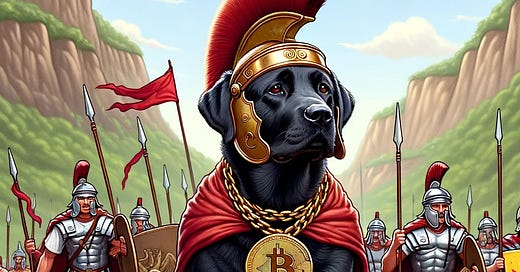Let The Die Be Cast
The Securities and Exchange Commission late Wednesday approved the launch of the first exchange traded spot Bitcoin ETF.
Anti-crypto SEC Chair Gary Gensler said the approval didn’t equate to an endorsement of Bitcoin, which he said was a speculative, volatile asset used for illicit activity including ransomware, money laundering, sanction evasion, and terrorist financing. Investors should remain cautious about the myriad risks associated with bitcoin and products whose value is tied to crypto, he said. https://www.sec.gov/news/statement/gensler-statement-spot-bitcoin-011023
The extent to which this widely anticipated approval is priced into the market remains to be seen.
Meanwhile, back in TradFi Land, biotech $IBB is the year’s best performing sector by far. Blackdawg sees plenty of upside. As they say, the longer the base, the further the race.
Emerging markets are the cheapest relative to US stocks in more than half a century.
And yet…
Damn Houthis
Japan’s Nikkei 225 rose above 34,000 for the first time in 33 years
Even the Chinese, tired of losses from their domestic stocks, are piling into the shares of their historic nemesis.
Chinese stocks hit a 5 year low amid concerns about the country’s economic recovery, potential deflation and troubles in the property sector. Monetary policy easing, cash injections and government buying of stocks have done nothing for China’s market.
Are you a 1%-er when it comes to reading? If you read 2 books last year you beat half the population. But you would have had to read 50 books to be in the 99thpercentile. I know at least a few Long Money Wrap subscribers are 1% -ers. Shout out to cuz @CalBerkley and colleague @Stanford, among others, no doubt.
This Day in History
In 49 BC, Julius Caesar crosses the Rubicon River, the northern border of Italy, starting a civil war resulting in him becoming dictator for life. Caesar defied the Senate’s order to disband his army and return to Rome saying "let the die be cast". While he only crossed with a single legion (he had 11), it was illegal to bring armies into Italy and his crossing the river under arms amounted to an insurrection and treason.
In 1776, Thomas Paine publishes his pamphlet Common Sense, advocating independence from Great Britain. Paine encouraged Colonists to fight for egalitarian government. It was sold and distributed widely and read aloud at taverns and meeting places which was a thing. In proportion to the population of that time (2.5 million), it had the largest sale and circulation of any book published in American history.
In 1870, John D. Rockefeller incorporates Standard Oil. At its height, Standard Oil Incorporated was the largest petroleum company in the world, and its success made its co-founder and chairman, John D. Rockefeller, among the wealthiest Americans of all time. In 1911, the U.S. Supreme Court ruled that it was an illegal monopoly and ordered its breakup. The only other conglomerate to be broken up on antitrust grounds was AT&T in 1984.
Speaking of the growing antitrust risks attendant with being a megacap tech (see yesterday’s Long Money Wrap), iRobot $IRBT plunged 20% today amid a Politico report that Amazon $AMZN won't offer concessions to European antitrust regulators. When you are a tech behemoth, even the smallest acquisitions draw government scrutiny.
In 1901, the first great Texas oil gusher is discovered at Spindletop in Beaumont, Texas. The geyser, which could be seen for miles, was discovered at a depth of over 1,000 feet, flowed at an initial rate of 100,000 barrels a day and took nine days to cap. Spindletop produced more than 20 million barrels of oil in the first two years.
Behavioral Economics Principle of the Day
Hindsight Bias: The tendency to believe that past events were more predictable or foreseeable than they actually were. It can lead to irrational behavior by distorting memory and influencing future decision-making based on a flawed perception of past events.



















